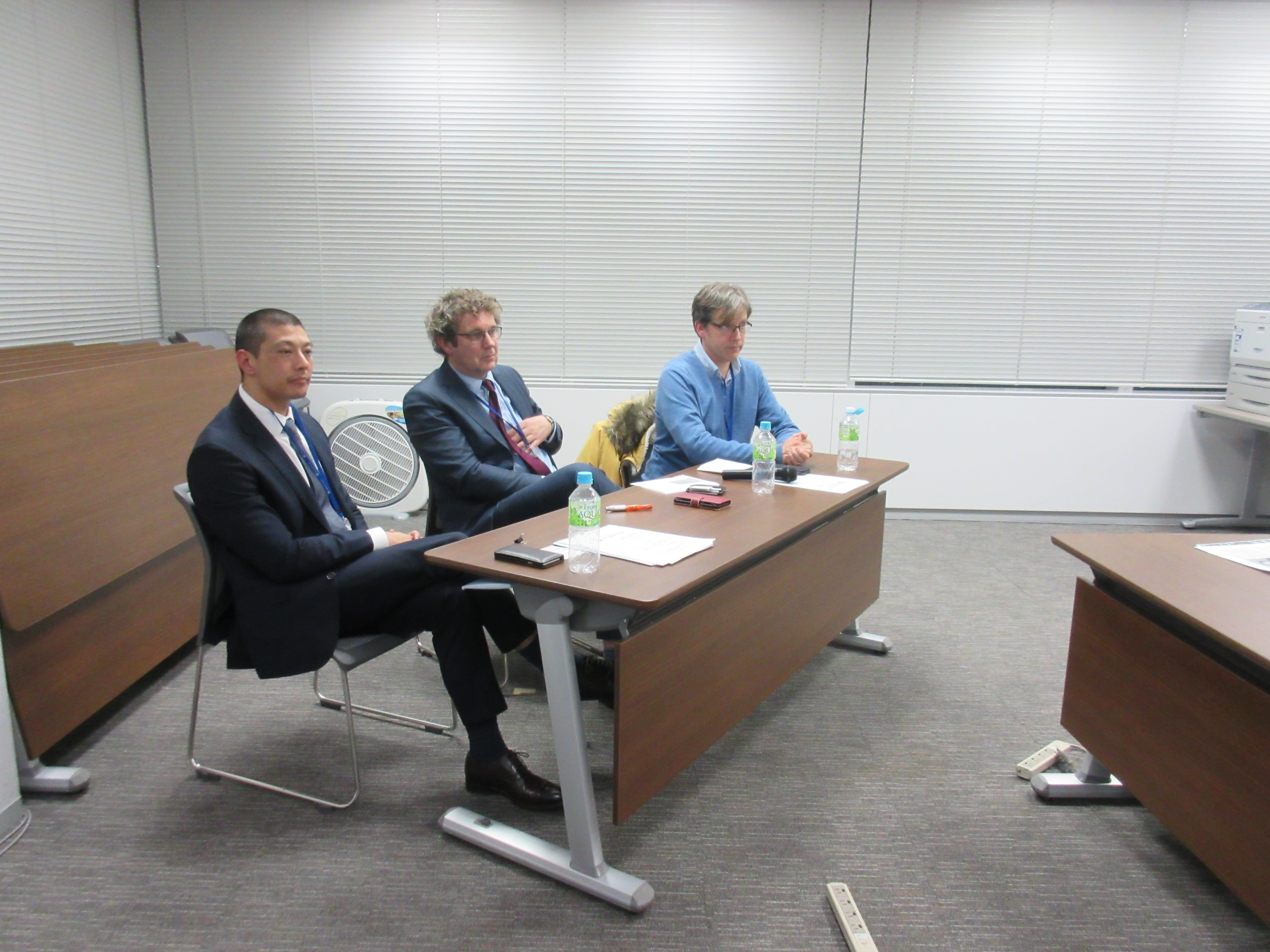1月31日 (木)に行われた公開研究会 「グローニンゲン宣言と外国学修歴・資格認証(FCE)の電子化に向けた取り組み」には、約15名が会場にて参加し、21名がウェビナーを通じて参加しました。


まず、研究会開催に当たって、その背景について芦沢真五氏から説明がありました。昨年、日本が東京規約を批准したことによって、外国学歴・資格を正式に認証するための審査に関して、日本の対応はこれまでと大幅に転換することになります。例えば、東京規約に基づくと、「実質的な差異(Substantial difference)」が認められない場合は、外国資格を正式に認証することが求められ、「実質的な差異」があると判断した場合は、どうしたらそのギャップが埋まるのかという情報提供をしなくてはならなくなりました。日本では、外国学歴・資格認証のための制度的な枠組みを急速に整備していく必要に迫られています。本研究会では、日本での制度設定を行う上での方策を検討するにあたり、欧米で進む外国学歴・資格・学習成果のデジタル化についての、先進的な取り組み事例についてご紹介いただきました。
まず、Groningen Declaration NetworkのExecutive DirectorであるHerman de Leeuw氏からは、グローニンゲン宣言に関する取り組みが説明されました。グローニンゲン宣言は、外国学歴・資格認証の鍵となる、国際協調のためのルールづくり、環境づくりなどを進めていくことを提唱しています。そして、グローニンゲン宣言を受けて始まっている他の国で始まっている外国学歴・資格認証のデジタル化の取り組みについても紹介がありました。
二人目の発表者であるHigher Ed ServicesのChief Executive OfficerであるAndrew Trnacek氏からは、オーストラリア・ニュージーランド地域で進められている「My eQuals」という大学が加盟する卒業資格のデジタル化のサービスが、急速に広がっている現状が語られました。この取り組みは、グローニンゲン宣言を受けての一つの実践例と言えます。
最後の発表者として、World Education Service(WES)のSenior StrategistであるMichael Porter氏からは、米国での資格認証を担うWESにおける、実際の「資格認証」の部分についての説明がありました。これまでWESのサービスを使うのは、大学や政府などでしたが、そのサービスをオンライン化することで、それ以外に対してもサービスの提供が広がることになるとのことです。
Q&Aでは、外国学歴・資格認証にあたり、異なる教育機関ごとにどのようにデータを標準化するかという問題や、これらの取り組みが全て政府ではなく民間主導で行われた理由、プライバシー・倫理の問題への対応、紙ベースのデータとの併存に関すること、日本に対する示唆についての質問が挙がりました。
最後に芦沢氏から、日本においても、今後、外国学歴・資格認証のデジタル化を円滑に進めていくことを視野に入れて準備を進める必要があり、本日、ご説明のあった取り組み事例とうまくシナジーを持って実施していく必要性が強調されました。
報告者:新見有紀子(一橋大学 法学研究科)
————————————-
About 15 participants attended the research seminar entitled “The Groningen Declaration and Digitalization of Foreign Credential Evaluation (FCE),” which was held on Thursday January 31 and open to the public, while a further 21 people joined via the online webinar.
The background of the seminar was first explained by Shingo Ashizawa of Toyo University. Last year, Japan ratified the Asia-Pacific Regional Convention on the Recognition of Qualifications in Higher Education, known as the Tokyo Convention, which clarified some basic principles of FCE. The ratification requires Japan to change its way of responding to the FCE process. For example, according to the Tokyo Convention, recognition of qualifications should be granted unless there are “substantial differences.” If there are “substantial differences,” the office responsible should provide guidelines on how to bridge the gap between the two. Due to the ratification of the Tokyo Convention, Japan is now facing the need to build an FCE system rapidly. In this seminar, therefore, three speakers introduced initiatives and practices regarding the digitalization of FCE in Western countries in order to act as points of reference for Japan in considering how to develop the FCE system here.
First, Herman de Leeuw, Executive Director of the Groningen Declaration Network, presented on the development of this network. This organization aims to set rules and create an environment for international coordination of the digitalization of FCE. He also introduced some examples of actions taken to digitalize FCE around the world in response to the Groningen Declaration.
Andrew Trnacek, the Chief Executive Officer at Higher Ed Services, then presented on the process of digitalization of academic credentials at universities in Australia and New Zealand through a service called “My eQuals.” This service has now been accepted by most of the universities in this region. This is one practical example of actions influenced by the Groningen Declaration.
Lastly, Michael Porter, Senior Strategist at the World Education Service (WES), presented on the digitalization of credential evaluation in the United States. Before digitalization, WES provided services mainly for universities and the government. However, after including online credential evaluation services, the pool of potential users of the service has grown larger.
In the Q & A session, the following issues were raised: the standardization of data for digitalization, the reasons why these initiatives were not led by the government, privacy and ethical issues surrounding digitalization, the use of data in paper format in addition to digital data, and the implications for Japan of developing such digitalization of FCE.
In conclusion, Shingo Ashizawa summarized the seminar, and stressed that Japan should prepare for the digitalization of FCE in order to ensure its smooth implementation. He also emphasized the necessity of collaborating and creating a synergy with the three initiatives introduced.
Yukiko Shimmi (Graduate School of Law, Hitotsubashi University)
